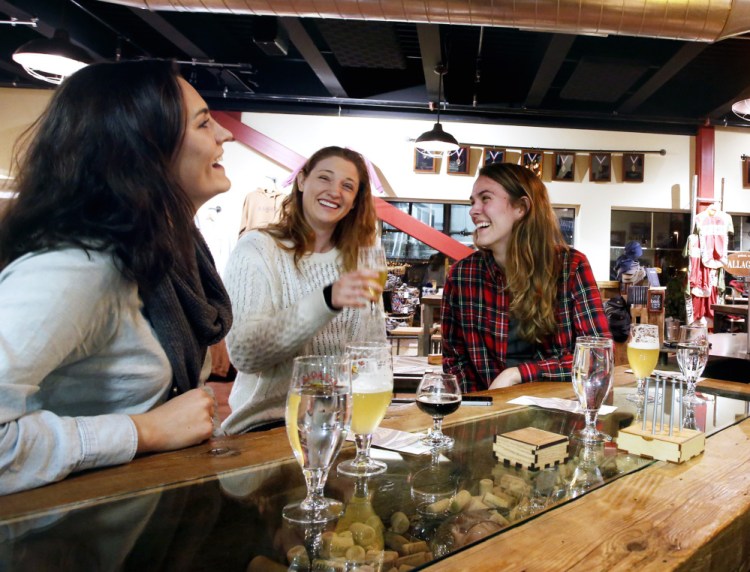Beer and pretzels are as natural a pairing as peanut butter and jelly, but one local brewery is finding that Portland zoning laws don’t necessarily see it that way.
A city zoning administrator has denied the Allagash Brewing Co.’s request to sell prepackaged snacks – such as chips, popcorn and trail mix – to beer tasters at the company’s brewery on Industrial Way, an area that has become a hotbed for beer enthusiasts who flock to its cluster of breweries to sample and buy fresh beer and ale. An Allagash representative will appear Thursday before the city’s Zoning Board of Appeals to try to have the ruling overturned.
“We’re not trying to expand our business,” said Jill Perry, Allagash’s retail manager. “We’re just trying to be responsible purveyors of alcohol.”
The city has been at the center of a craft brewery explosion in Maine. The state is home to more than 50 breweries, and 13 of them are in Portland. Tasting rooms at the breweries have become popular destinations, but city zoning laws aren’t always in sync with the evolving industry.
Zoning Administrator Ann Machado said in a Dec. 30 letter to the appeals board that serving food is not allowed in the moderate industrial zone, because it is not an “ancillary use.”
“A tasting room and the retail sale of beer are ancillary uses to the permitted use as a brewery,” Machado wrote. “The sale of pre-packaged food is not accessory to the brewing of beer.”
WHAT ABOUT T-SHIRTS, SOUVENIRS?
That interpretation also calls into question whether T-shirts, stickers and pint glasses can legally be sold at the area’s breweries.
“Just as the sale of clothing and other items are not a direct product of the brewery, neither is providing snacks in the tasting room,” Machado wrote.
However, the sale of T-shirts and other souvenirs is common at Allagash and other local breweries, and the city has not objected. City Hall Communication Director Jessica Grondin said the city has not received any formal complaints about breweries breaking zoning rules, and none has formally applied for permission to sell T-shirts, as Allagash did to sell snacks.
Allagash began as a one-man operation in 1995. Now, its beers are available in 17 states and the District of Columbia. Its brewery at 50 Industrial Way was built in 2006 and expanded in 2012 to include a large tasting room that could easily be mistaken for a bar. Guests are offered free tours and free 3-ounce servings of four different beers.
Nearby breweries such as Bissell Brothers, Foundation and Austin Street charge for their beer samples, but none of the tasting rooms provides food or snacks – one thing that distinguishes them from full-service bars.
Perry said Allagash wants to offer snacks because more people are spending time at all of the area’s breweries. It makes sense for visitors to eat something as they hop from one brewery to another, to help offset the effects of the alcohol they are drinking, she said. Sometimes there is a food truck on site, but other times there is not.
BREWERY MUST FOLLOW CURRENT LAW
Machado said there is no need to temper the effects of alcohol at Allagash “because only a small amount (of beer) would be sampled and the customer would not stay there all day drinking samples.”
More than 70,000 people are expected to visit Allagash this year, but the snacks are not intended to encourage visitors to linger, Perry said.
“We’re not trying to get people to stay here longer,” she said.
Unlike other breweries, Allagash does not sell beer to be consumed on site – ideally, tasting-room visitors will find a beer they enjoy and buy some to take home. Higher turnover means more people can sample the beers.
The no-food rule doesn’t apply to the Spare Time bowling alley, next door on Riverside Street in the same moderate industrial zone. According to its website, the business offers a full menu prepared in its kitchen.
Although both businesses are in the same zone, it has not always been that way, Machado said in an email. The bowling alley is exempt from existing rules because the zoning regulations when it was built in the 1990s allowed food service.
“Allagash has to follow the current requirements,” she said.
Send questions/comments to the editors.



